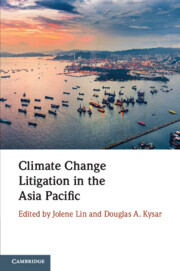Book contents
- Climate Change Litigation in the Asia Pacific
- Climate Change Litigation in the Asia Pacific
- Copyright page
- Contents
- Figures
- Tables
- Contributors
- Foreword
- Abbreviations
- Introduction
- Part I Theoretical Underpinnings and Implications of Climate Change Litigation
- Part II International Law and International Adjudication
- Part III Domestic Law and Domestic Adjudication
- Part IV China, Courts and Climate Change
- 12 Climate Change Litigation: A Promising Pathway to Climate Justice in China?
- 13 The Subordinate and Passive Position of Chinese Courts in Environmental Governance
- 14 Tort-Based Public Interest Litigation on Air Pollution in China: A Promising Pathway for Chinese Climate Change Litigation?
- Index
14 - Tort-Based Public Interest Litigation on Air Pollution in China: A Promising Pathway for Chinese Climate Change Litigation?
from Part IV - China, Courts and Climate Change
Published online by Cambridge University Press: 06 November 2020
- Climate Change Litigation in the Asia Pacific
- Climate Change Litigation in the Asia Pacific
- Copyright page
- Contents
- Figures
- Tables
- Contributors
- Foreword
- Abbreviations
- Introduction
- Part I Theoretical Underpinnings and Implications of Climate Change Litigation
- Part II International Law and International Adjudication
- Part III Domestic Law and Domestic Adjudication
- Part IV China, Courts and Climate Change
- 12 Climate Change Litigation: A Promising Pathway to Climate Justice in China?
- 13 The Subordinate and Passive Position of Chinese Courts in Environmental Governance
- 14 Tort-Based Public Interest Litigation on Air Pollution in China: A Promising Pathway for Chinese Climate Change Litigation?
- Index
Summary
Public interest litigation to address air pollution has been a novel judicial phenomenon in China since 2016. The modification of the Civil Procedure Law in 2012 and the Environmental Protection Law in 2014 conferred standing on environmental NGOs and public prosecutors to bring environmental public interest litigation cases. The introduction of these reforms has led to a rapid increase in the number of environmental public interest litigation cases. Given the similarities shared by climate change and air pollution, this chapter seeks to shed light on how tort-based air pollution public interest litigation has advanced in China and considers whether it presents a potential avenue for the emergence of climate change litigation in China. It argues that current public interest litigation on air pollution may not only indirectly prepare legal preconditions for climate change litigation but may also directly become the pathway for climate change litigation.
Keywords
- Type
- Chapter
- Information
- Climate Change Litigation in the Asia Pacific , pp. 394 - 415Publisher: Cambridge University PressPrint publication year: 2020
- 1
- Cited by

